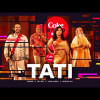The making of Coke Studio Bangla’s complex subjects

I am neither a musician nor a music critic. Nor am I trained in assessing the technicality of a music performance. However, as a trained feminist anthropologist, I love to follow—borrowing Arjun Appadurai's phrase—the social life of things. Since Coke Studio Bangla launched in Bangladesh in 2022, it has been fascinating to follow its social life. There are some interesting and complex dynamics of how people—both in Bangladesh and abroad—have consumed, cherished, and criticised its productions.
Critiques coming from the leftist and progressive sides have been debating the politics of imperial appropriation and commodification of folk music by Coke Studio Bangla. Questions have been raised as to who has the authority to curate music, what kind of agency local, grassroots artistes performing in Coke Studio Bangla have (or don't have), whether Coke Studio Bangla is creating a hegemony in Bangladesh's music tradition, and whether folk music cultures and traditions can be effectively revived through profit-driven corporate sponsorships.
We must keep discussing, debating, and exploring all these questions in detail to understand how Coke Studio is shaping the landscape of music in Bangladesh. However, the avid critiques, which tackle critical questions of appropriation and commodification of folk music by Coke Studio Bangla or the way Coke Studio Bangla promotes a middle-class neo-imperialist imagination of "folk" and "fusion," often miss an empathetic understanding of individual actors within the Coke Studio landscape—actors that include both the audiences and the performers. The critiques sometimes miss a vital point that these actors are not mere puppets of an imperialist-corporate-capitalist machine. They live complex lives within the landscape of Coke Studio Bangla and beyond, and they go through complicated, multi-layered decision-making processes regarding their engagement with Coke Studio Bangla.
Let's think about the generation hooked on Coke Studio Bangla's magic. People who write on social media about how they were touched by the latest releases or who post reaction videos or dance covers mostly come from educated, urban or semi-urban, and middle- and upper-middle-class backgrounds. They have smartphones, know how to navigate social media, and have a working knowledge of English.
Most of them heard about the Dewan dynasty and its tremendous contribution to Bangla folk music for the first time from Coke Studio Bangla. They did not grow up listening to Gonjer Ali's Taat songs or reading Ali's book on the collection of local Taat songs from North Bengal. They got introduced to Hason Raja's music through Humayun Ahmed's dramas and cinemas, but most of them were not familiar with the incredible work of Hason Raja devotee Hamida Banu, who was featured in the last song in season two of Coke Studio Bangla, titled "Dilaram."
How many of us know that Hamida Banu lost her father at the age of 15, faced backlash from the local community for singing as a young woman, had to endure a child marriage, and migrated to India as an undocumented immigrant? How many of us know that Banu was in prison in India for three years for crossing the border without proper documents, and also worked as a housekeeper in the Hason Raja Bari? Jahura Baul from "Bonobibi" or Islam Uddin Palakar and Fajlu Majhi from "Deora" also have intriguing stories, which were largely unheard of before this hooked-on-Coke-Studio generation got introduced to their work through this platform. Suddenly, previously uploaded videos of the performers on YouTube saw a massive hike in the number of views.
It is important to dive deeper into Coke Studio Bangla's involvement with "supply chain capitalism," a term borrowed from Anna Tsing (2009), which examines both the massive border-crossing scale and the diversity of global capitalism. I would argue it is inadequate to develop an oversimplified criticism of Coke Studio Bangla, exclusively focusing on the appropriation of Bangla folk songs or the commodification of the performances of folk singers.
Many of this generation appreciate Coke Studio Bangla because they love the "feel-good" story of this platform amplifying the voice of grassroots—and often marginalised—artistes and giving them a powerful platform. Little do they think about how these actors negotiate their everyday lives. Take rapper Aly Hasan, for example. Hasan does not come from any Chhayanaut-trained, educated, culturally elite background. In its quest for performers from the margin, Coke Studio Bangla recognised Hasan's work and gave him a spotlight in the latest song "Ma Lo Ma."
Hasan spent three years of his life as a migrant worker. After returning to Bangladesh, he took over the small business of his father, who got sick. Hasan's small hardware shop failed to generate profit in the current economic situation, and he had to close it down due to financial losses. His "Bebshar Poristhiti" is a rap based on his everyday struggles. Similarly, his "Bazar Gorom" is a bold statement against the extreme price hike of everyday necessities. In a country where a journalist was jailed for pointing out the necessity of "machh, mangsho ar chailer shadhinota," the song "Bazar Gorom" can be interpreted as a strong critique of the Bangladesh government's failure to address inflation, the government taking loans from the central bank, the central bank printing a considerable amount of currency for the government, or the devaluation of the Bangladeshi taka against the US dollars, further exacerbating the situation.
But hold on. No, Aly Hasan—even though his work represents working-class struggles—is not your dream-leftist-working-class staunch critic of the establishment. Right before the election, he worked as part of a team that released a music video titled "Unnoyoner Shopnojatra" ("The Dream Journey to Development"). Aly Hasan was one of the people who wrote the lyrics and composed and sang it. The video talks about how "Gram hochchhe shohor aar egiye jacche desh" ("Villages are turning into cities, and the country is moving forward"). It uncritically provided an extensive list of all the major development projects undertaken by the ruling government despite some of their negative impacts on the environment and the community. In the song, Hasan repeatedly urged people to vote for the ruling party that has been in power since 2009. Hasan also had to sell his music productions to G Series as the commercial distribution of his production was probably the only viable means for ensuring a sustainable livelihood.
It is important to dive deeper into Coke Studio Bangla's involvement with "supply chain capitalism," a term borrowed from Anna Tsing (2009), which examines both the massive border-crossing scale and the diversity of global capitalism. I would argue it is inadequate to develop an oversimplified criticism of Coke Studio Bangla, exclusively focusing on the appropriation of Bangla folk songs or the commodification of the performances of folk singers. The debates around the authenticity of local music also become futile without paying attention to the complex landscape of Coke Studio Bangla's various structures that uniquely mobilise capital, labour, bodies, and resources.
We need to dive deeper into how and why folk artistes, such as the Chhad Petano team, Hamida Banu, Islam Uddin Palakar or Aleya Begum, decided to comply with the hegemonic terms and conditions of Coke Studio Bangla. Are there any viable means to produce and circulate folk music that can operate without powerful corporate sponsorship, gain significant circulation, and ensure sustainable living for the local artistes and performers?
How do emerging artistes from marginalised and minoritised communities, such as Animes Roy or Daughter of Coastal, negotiate their complex positionalities within Coke Studio Bangla and beyond? What does it mean for many of these artistes to openly express their deepest gratitude for inclusion in Coke Studio Bangla in the "Behind the Magic" interviews? How do they navigate mainstream, male-stream, and nationalist expectations of an audience who would appreciate the performances only if these are packaged in a way that appeals to their taste?
Why do we see that the composers and producers are not bringing major changes in the structure and format of Rabindra Sangeet and Nazrul Sangeet, but they feel comfortable enough to modify tunes, words or formats of folk songs? Why do we see women performing on stage and following instructions of the music directors, but they are almost totally absent in music production? What does it mean for the liberal-progressive audience to cherish Coke Studio Bangla productions, but then call for a boycott of Coca Cola to express solidarity with Palestine?
Oversimplified critiques of authenticity, appropriation, and commodification of Coke Studio Bangla, which do not dive deeper into the complex decision-making processes of its audiences as well as performers, would only construe these subjects as passive, voiceless, compliant victims. A holistic critique needs to examine how Coke Studio Bangla operates within diverse structures of supply chain capitalism, making it almost inevitable for its actors to comply with the hegemonic norms.
Nafisa Nipun Tanjeem is an educator, researcher, writer, and activist. She is associate professor in the Department of Interdisciplinary Studies at Worcester State University in Massachusetts, US.
Views expressed in this article are the author's own.
Follow The Daily Star Opinion on Facebook for the latest opinions, commentaries and analyses by experts and professionals. To contribute your article or letter to The Daily Star Opinion, see our guidelines for submission.

 For all latest news, follow The Daily Star's Google News channel.
For all latest news, follow The Daily Star's Google News channel. 











Comments